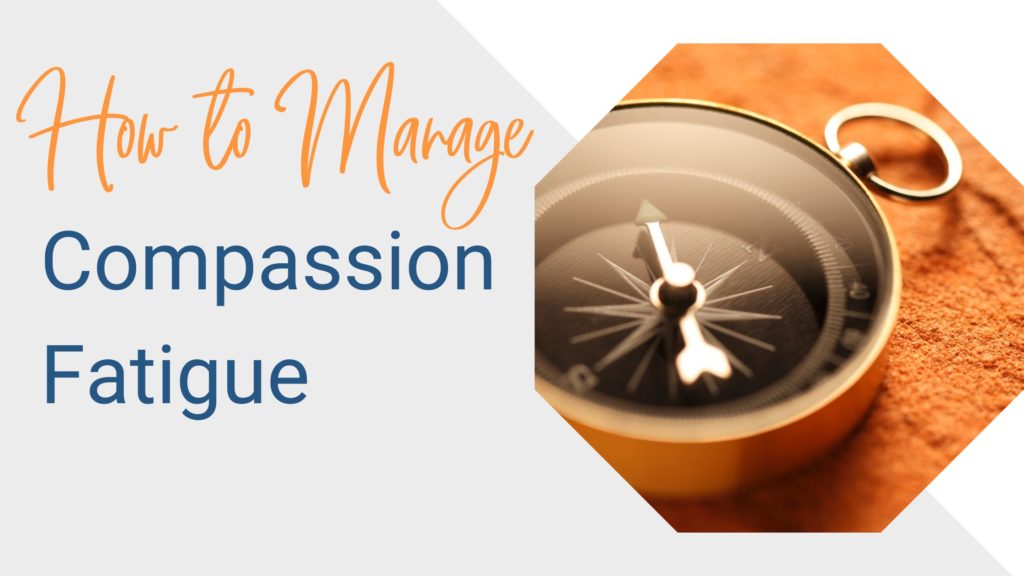Do you know how to manage compassion fatigue as a health coach? Have you ever experienced a time as a coach when you found it challenging to feel empathy or compassion for your clients? Maybe you even began to feel anger towards your clients and their health issues or even felt like withdrawing. You may have been experiencing compassion fatigue.
Compassion fatigue is experienced by caregivers, first responders, doctors, therapists, mental health workers, coaches, and anyone else helping others who are experiencing chronic illness, pain, or recovering from trauma. Most people are unaware compassion fatigue even exists. But it is a growing issue that is now affecting even those who are not working in health and healing-related fields.
What is compassion fatigue?
Compassion fatigue is not a disease or disorder, but a type of chronic stress that results from caring for others who are experiencing physical, mental, or emotional pain. Although some mental health professionals consider it a type of burnout, it differs from burnout. Burnout develops slowly over time, but compassion fatigue tends to come on more quickly. It can also be progressive, meaning symptoms will increase in intensity over time.

Common symptoms
If you are concerned about compassion fatigue, it is important to understand what the common symptoms are. They can be similar to the symptoms of chronic stress. This is because they stem from the stress of caring for others, without taking enough time for self-care.
Common symptoms include:
- Sleep problems
- Intense emotions
- Trouble focusing
- Increase in depression and anxiety
- Withdrawal and isolation
- Physical exhaustion
- Feeling hopeless
- Anger directed toward the cause
- Loss of self-worth
- Personal relationships suffer
- Self-medicating with drugs, alcohol, food leading to addiction
- More irritable towards others
- Increase in sickness, aches, and pains
It is rare for people to address compassion fatigue because most people are unaware of what it is. But this delay in addressing it can not only impact the quality of life but can become debilitating.
As a coach, you are aware chronic stress of any kind is detrimental to a person’s overall health. But even health coaches can face health challenges if they aren’t aware of their own state of stress. So how can you, as a coach, avoid the pitfalls that come with compassion fatigue or begin healing from that level of stress?

Preventing and reversing compassion fatigue
Many people live their lives on autopilot and are out of touch with how they are doing mentally and emotionally until things get bad. But to prevent or overcome compassion fatigue, awareness is key. It is important to check in with yourself so you can gauge how you are really doing.
Making self-care a priority
As a coach, you want your clients to invest in their health care. You most likely encourage them to practice regular self-care. So, it is important you are doing the same! Self-care must be a priority and something you practice daily. This not only sets a great example for your clients but also helps to keep you from developing compassion fatigue. This presents a great opportunity for you to look at your regular self-care routine.
Here are some questions you can ask yourself:
- What are you doing each day to take care of your own physical, mental, and emotional needs?
- Are you setting healthy boundaries with others including your family, friends, and clients?
- If you find you are working too many hours each week and becoming overwhelmed, where can you cut back?
- Are you taking regular vacation time away from work (this is especially important if you run your own business)?
- Are you taking time to be social with family or friends?
- How are you feeling emotionally?
Take the time to check in with yourself to see how you’re feeling and if you need to take some extra time to focus on your own needs.

Get enough sleep
Are you getting enough sleep each night? As a coach, you may be trying to take care of the administrative needs of your business along with handling a full schedule of clients who are facing their own health struggles. It can be easy to compromise sleep to get more done. While stress is the main cause of compassion fatigue, if you aren’t getting enough sleep, it can exacerbate the problem.
Look at your sleep hygiene. Be sure you are regularly getting at least 7-9 hours of sleep a night and be consistent with your sleep schedule.
Talk to someone
If you’re finding yourself struggling with the symptoms of compassion fatigue, it can help to find someone to talk to about what you’re experiencing. Having someone you trust to share your emotions and experiences can help. It may also benefit you to talk with a mental health professional. They may be able to give you additional coping strategies to help you get through your compassion fatigue more easily.
Take some time off
If you’ve been struggling with compassion fatigue, it may be time to take a break from work. When was the last time you took a vacation or took some time off away from your job? It is important to disconnect from your work so that you can relax. This is a great time to work on new habits and reconnect with yourself. This could also be a good time for you to connect with family and friends and enjoy some time socializing.

Eat well and exercise
While you already know how important it is to eat healthy foods and get your body moving, it can be easy to forego healthy habits when you’re amid intense stress. Be mindful of the foods you’re eating and choose healthy options instead of attempting to soothe yourself with junk food and sugary snacks. Make time daily to move your body and get regular exercise. Doing so can help you recover from compassion fatigue more quickly.
Avoid escaping in unhealthy ways
When experiencing extreme stress, it is normal to just want to find a way to feel better. But often in these times, people turn to unhealthy ways to soothe themselves. Drinking, doing drugs, shopping, overeating, endlessly scrolling social media, binge-watching television all seem to help at the moment. But ultimately these patterns only serve as a way for you to escape at the moment and can become destructive. Finding coping skills that legitimately help reduce your stress and not just escape or avoid your stress momentarily are far healthier.

Conclusion
Compassion fatigue doesn’t have to derail you. Being mindful about how you’re feeling and taking action if you notice compassion fatigue impacting you can help you rebound more quickly. And that allows you to give more to your clients by being the best you possible!









